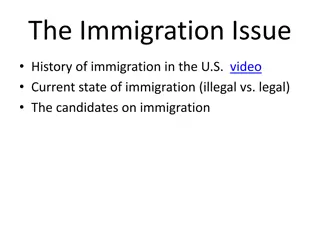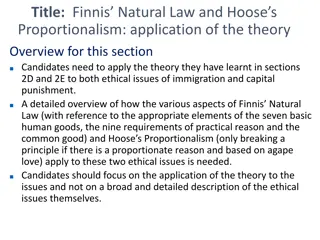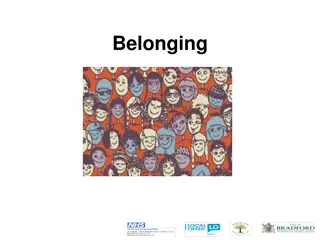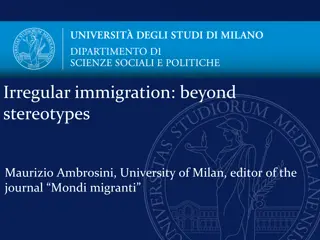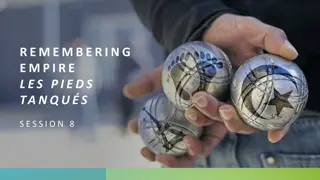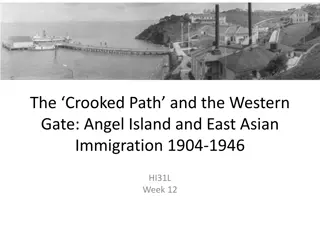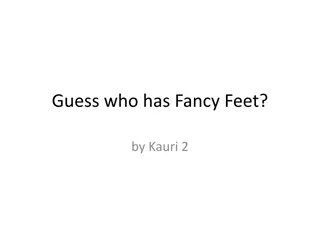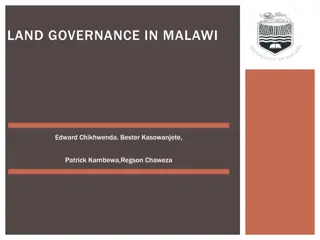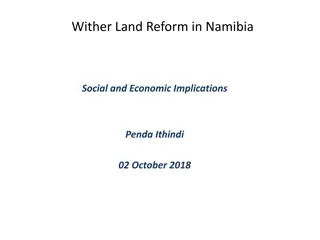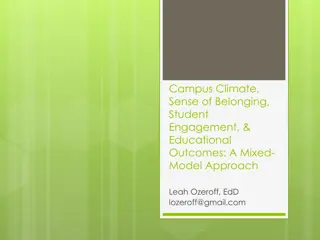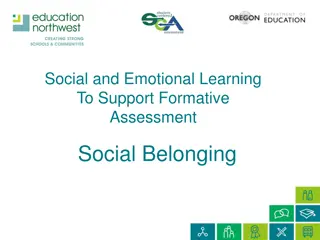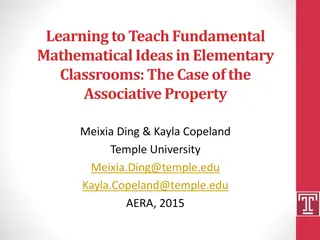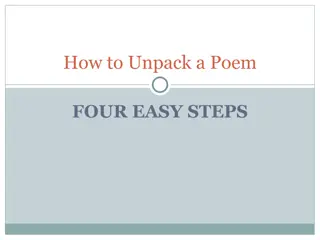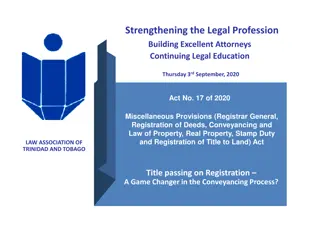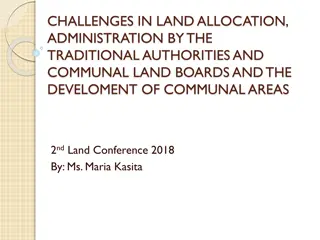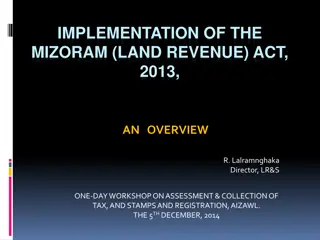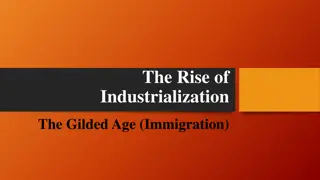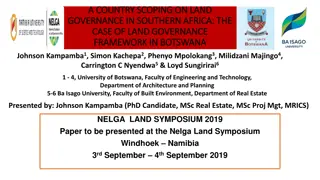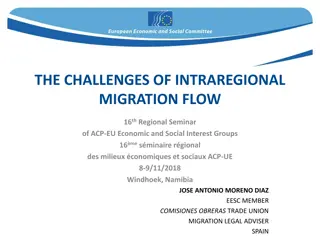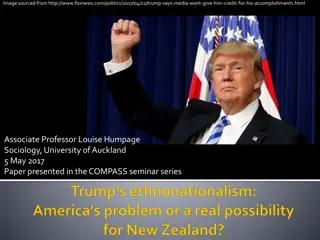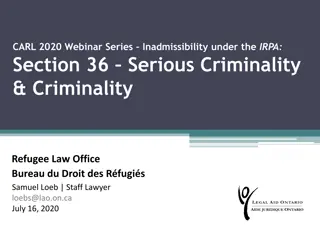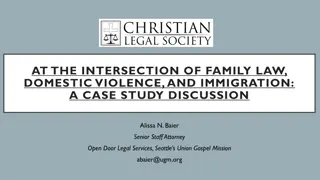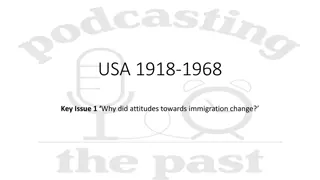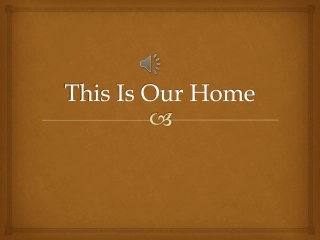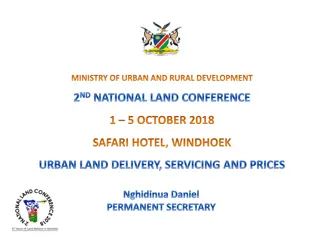Unpacking Themes of Immigration and Belonging in "The Land Beneath My Feet
Explore the complex themes of immigration, home, and conflicting memories in the play "The Land Beneath My Feet." Delve into the narratives of different characters and their perspectives on belonging, identity, and the concept of home. Reflect on the challenges of defining one's roots and the impact of historical events on personal and collective identities.
Download Presentation

Please find below an Image/Link to download the presentation.
The content on the website is provided AS IS for your information and personal use only. It may not be sold, licensed, or shared on other websites without obtaining consent from the author. Download presentation by click this link. If you encounter any issues during the download, it is possible that the publisher has removed the file from their server.
E N D
Presentation Transcript
REMEMBERING EMPIRE THE LAND BENEATH MY FEET S E S S I O N 8
THE LAND BENEATH MY FEET This session: Pages: bottom of p. 22 to p. 34 in the printable version of the play. Themes: Immigration, home, conflicting memories Online Sections: 5. Z s pied-noir experience (until I never knew him, but sometimes it's like he speaks through me.) 6. Loule s experience as a Marseillais (until Loule leaves the court, exasperated.) 7. Monsieur Blanc s father (until out of helicopters far out at sea.)
OUR HOME Read: from the bottom of p. 22 until p. 23, all rubbing along together fine...by some miracle!' We read about Z s experiences from the pied-noir perspective. Z Except that we weren t colonisers. We were just poor folks that got chased from our ome. Yaya Except that it wasn t your home! Z (he stands up and moves towards Yaya) It wasn t our ome? After five or six generations! It wasn't our ome? You want a punch in the mouth? Why does Z believe Algeria was our home and why would Yaya challenge this? In your view, when does one have a right to say that somewhere is our home ?
OUR HOME Why does Z believe Algeria was our home and why would Yaya challenge this? As we discussed in earlier sessions, families like Z s often moved to Algeria as a chance to escape poverty or other difficult circumstances. Many lived there for four or five generations before they were forced to leave after the war. In your opinion, when does one have a right to say that somewhere is our home'? Is it a legal question? Do you have to be a citizen of a country to belong? If you are part of a group that has invaded someone else's country, do you ever have the right to consider it as your home? Or can anyone decide where home is? What might determine your views on this?
OUR HOME Z What else did we ave to believe in? We made that country! We built it with our own blood... Yaya And with theirs too. - What is Yaya referring to here? Z We were Algerians! What were we guilty of? Of feeling at ome? We invented a whole country, a whole culture! French, Italians, Greeks, Maltese, Spaniards, Jews...all rubbing along together fine...by some miracle! Yaya And nine million Arabs you couldn t care less about! Do you agree with Z that we invited a whole country, a whole culture'? Why or why not?
OUR HOME Z What else did we ave to believe in? We made that country! We built it with our own blood... Yaya And with theirs too. - What is Yaya referring to here? Yaya is referring to the fact that many Arabs and Berbers died as a result of the invasion and colonisation. Do you agree with Z that We invented a whole country, a whole culture!' Why or why not? The settlers contributed to the creation of a specific culture and state in Algeria. However, there were indigenous cultures and populations present before the French arrival. Z is choosing to ignore the fact that the French destroyed those pre-colonial cultures.
Read: the rest of page 23 and page 24 until Z collapses back in his seat. A pause.' Discuss: 1. What are the two opposing views of the relationship between the pieds-noirs and the indigenous peoples in Algeria? 2. How is this dispute represented in the movements and voices of the characters in this scene? 3. What is a civilising mission'?
1. What are the two opposing views of the relationship between the pieds-noirs and the indigenous peoples in Algeria? Z asserts that his family like other settlers respected and were friends with the indigenous peoples in Algeria. Yaya argues that the indigenous people were only liked if they were silent, knew their place as subordinate to the settlers, and worked hard. 2. How might this dispute be represented in the movements and voices of the actors in this scene? Consider the volume, the agitated nature of the gestures, the exasperation, their physical distance.
THE 'CIVILISING MISSION' France s colonial ideology was based on a belief in its civilising mission , the nineteenth-century notion that, as a culturally sophisticated European country, France had a duty to bring the benefits of civilisation to less developed parts of the world. These benefits included Christianity, education, medicine and technology but in reality they were used as justification for exploitative colonial practices that enriched France and subjugated indigenous peoples to French rule. Discuss: 1. In your opinion, are the realities of the civilising mission' compatible with France s values of liberty, equality, fraternity ? Why/Why not? 2. Given the original injustice of conquest and the strength of opposition from the settlers, do you think a just relationship between Algeria s inhabitants was ever possible?
E XC E R P T F O C U S : P O L I T I C S O F R E P E N TA N C E Read: p. 24 Loule (to Yaya) So you're trying to put the last hundred years of French colonialism on his shoulders, are you? And what about the slave trade too while you're at it? And the extermination of the Indians, the Kanaks, the M oris, the Malagasy...(gradually getting worked up) The annexing of the southern territories, the rainforests, the looting of the mines and all the bloody rest of it! The rape of the giraffe-necked women, Tintin in the Congo, Yabon Banania! Yaya Talk about going too far! Loule Yeah, well going too far is my thing, you know? As the representative of the white man, the spawn of Satan himself, the Westerner, Uncle Sam's cousin: the worst of the worst. Who should pay for these centuries of wickedness for all eternity?
E XC E R P T F O C U S : P O L I T I C S O F R E P E N TA N C E Read: p. 24 Yaya has attempted to make other characters feel guilty. Loule accuses Yaya of blaming Z for all of the evils of French colonial policy and, beyond that, Western imperialism. Loule makes his point by exaggerating the list of crimes for which he claims the white man is held responsible, ridiculing the idea of holding a single white Western individual responsible. He mentions examples of advertising (Banania breakfast milk) and books that are famous for their depictions of blackness as backwards and uncivilised. Look at these examples referenced by Loule on the next slide. What are your thoughts on them and Loule s reaction? Note, these images contain offensive stereotyped depictions of blackness.
E X C E R P T F O C U S : ' P R O V E N C E ' S L E G E N D A R Y H O S P I TA L I T Y Read: pp. 25- 28 until Loule leaves the court, exasperated'. Z Well let me tell you a bit about me because your insinuations are starting to get on my wick...Us Pieds-Noirs didn't feel very welcome ere when we arrived with nothing but the clothes on our backs. All this about Provence's legendary hospitality...there certainly wasn't much o that about when we arrived in Marseille! From what you have learnt so far, why do you think Z says that the pieds-noirs weren t welcomed when they arrived in France?
Leaving Algeria in haste with few belongings, many pieds-noirs found themselves in search of accommodation and jobs on their arrival in France. But with 600,000 arriving in France in the spring of 1962, the available resources were stretched to breaking point. Marseille, a city of 600,000, saw its population double. The local population quickly became exhausted by the repatriates and their needs. Many Marseillais shared the communist anti- colonial sympathies of Loule s father. Later in the 1960s hundreds of thousands of Algerian Muslim men also arrived in Marseille, seeking work. France was booming economically and wanted labourers for its construction sites. Many French citizens found the influx of Algerian workers difficult to reconcile with the war which Algerians had fought for independence. They found it difficult to understand why people who had fought for independence now wanted jobs in France. Why might Algerians have looked for work in France? Think about how the Algerian economy might have been destabilised by independence.
THEY SHOULD STAY OVER THERE Loule - They should stay over there... But they seem to think this is a place of refuge for them, that it owes them something, that it's guilty of subjugating them, of betraying them! They bit the hand that fed them and still want to come back for more, don t they? And make us pay for it too... Monsieur Blanc Loule, you are angry. You don't really mean what you're saying! Loule And then there s the Johnny-come-latelies! The ones who think this land belongs to them just because they bought a piece of it, and all they see here are fields they can endlessly concrete over... One huge theme park where I'm the performing monkey! Monsieur Blanc Am I a Johnny-come-lately then? Loule Not you, no. You re just a duffer! Why would Monsieur Blanc sense that Loule is referring to him here?
THEY SHOULD STAY OVER THERE Loule argues that those from Provence feel that their homeland is being changed by waves of incomers, whether immigrants, refugees or bourgeois Parisians relocating to a Provencal Disneyland. As M. Blanc has recently come from Paris to buy land to build on, probably for a holiday home, he senses that this is referring to people like him. It's unusual to hear the same language used for immigrants and rich second home-owners but Loule resents both groups. In your opinion, do we still hear arguments like this today?
Think about the emotions in this scene. In the performance of the play, the audience laughs at Z and M. Blanc s reactions to Loule's comments about 'all and sundry' and Loule s responses. Why? Z senses he, or at least the pieds-noirs, are being targeted in Loule s comments about those who came and took over space and resources in Provence. M. Blanc senses that he too is being targeted by Loule due to his comment about the wealthy outsiders coming and buying up and building on his native land. When challenged by both Z and M. Blanc on this, Loule insists he doesn t mean them specifically. It is comical that he accuses the groups to which they belong but is quick to say that he is not talking about the individuals standing in front of him.
G R O U P S T U DY: M O N S I E U R B L A N C S FAT H E R In groups, read: end of pp. 31-4 / end of online section 7 Group 1: M. Blanc - 'My father was just a man too' to 'Monsieur Blanc - Yes' Group 2: 'Monsieur Blanc continues' to 'Like Camus, you see: he held his peace.' Group 3: Loule - 'Why didn't he quit ?' to 'helicopters far out at sea' Describe what we learn in each of your sections about M. Blanc's father. How is empathy created for M. Blanc s father in this scene despite his role?
Group 1: 'My father was just a man too' to 'Monsieur Blanc - Yes' M. Blanc does know more about his father than he claimed before. His father was in charge of an interrogation (torture) centre in Algeria. He believed that he was fighting for his country. Group 2: 'Monsieur Blanc continues' to 'Like Camus, you see: he held his peace.' M. Blanc s father had been captured and tortured during WWII. He was also sent to fight in Indochina where he was captured and sent to a re-education (torture) camp in Vietnam. He nearly died several times for France. Ultimately, he killed himself from shame at the actions he had been ordered to carry out. Group 3: Loule - 'Why didn't he quit ?' to 'helicopters far out at sea' M. Blanc s father was involved in the torture of those questioned by the French forces. He was reluctant to use torture but didn t step down for fear that someone worse would replace him.
READING GUIDE Update the reading guide on the play. Discuss what you can include with a partner or a group then share your ideas.
CHARACTER PROFILES Update your character profiles based on what you have read this week. Discuss what you can include with a partner or a group then share your ideas.



